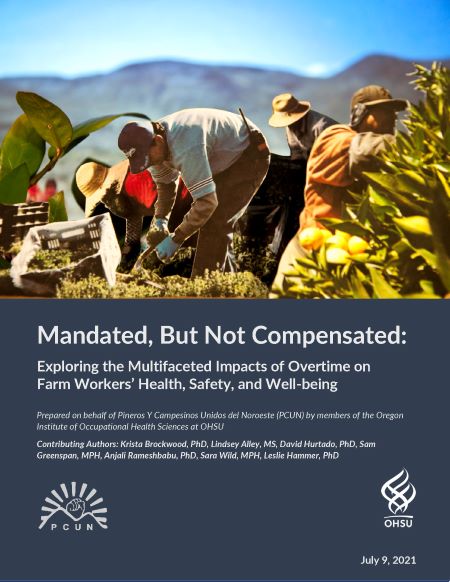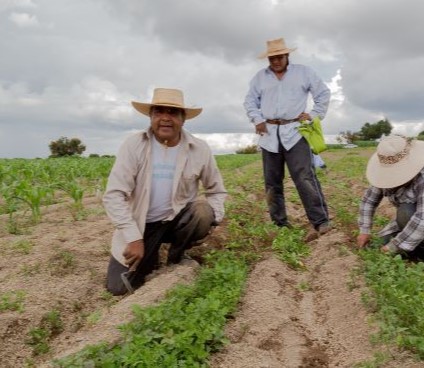
OVERVIEW
In 2020, dairy workers in Washington finally won the right to overtime pay and other protections most workers have had since 1938. Their victory at the WA Supreme Court struck down racist policies that had excluded agricultural workers – workers who have always been predominantly Black and Brown, and who are 99% Latinx in Washington state today — from nearly universal worker rights. Overtime pay for all agricultural workers is being phased in now, even as large agricultural interests try to roll back the law.
In the 2023 legislative session, bills were introduced to allow agricultural employers to suspend full overtime pay for any 12 weeks (the length of a typical picking season) they choose each year – returning farm workers to second-class status. However, a strong coalition of farm workers, unions, and advocates successfully pushed back and these harmful bills did not advance to a floor vote in either the House or Senate!
We will continue to defend overtime pay for farm workers so the new law can positively impact workers’ incomes, health, families, and communities.
Why We Need Overtime Pay
“We leave our children for others to take care of and we pay a lot too.”
OVER THE YEARS
A Brief Timeline of the Racialized History of Agricultural Labor
1500s – 1900s
All workers – including enslaved indigenous, African and Black people, as well as paid laborers – have no protections under colonial and U.S. governments
1938 – 2020
Agricultural workers are excluded from the many rights and protections workers gain during this time
2020 – Present
Washington passes law to phase-in overtime pay
1619
First known people are kidnapped from Africa and forced into enslaved agricultural labor in what would become the United States of America.
1700s (to present)
The mass theft of indigenous land rapidly accelerates through hundreds of forced and broken treaties, and policies such as the Indian Removal Act (1830), Trail of Tears, and Homestead Act (1862, signed by Abraham Lincoln) which allowed white people to freely claim up to 160 acres as their own property, increasingly westward. Agricultural business takes place on, and profits from, this land today.
1865
Slavery is technically abolished and replaced with Jim Crow laws and Black Codes which separate and oppress Black Americans, including dictating when, where, and how they may work. Slavery is upheld as “punishment for crime” and the mass incarceration of Black Americans begins.
1938
The Fair Labor Standards Act sets a minimum wage, requires employers to pay overtime, and makes it illegal to employ children under the age of 14. Excluded from these protections are agricultural workers who are disproportionately Black, Mexican and Mexican American.
1942
Bracero Program brings agricultural workers to the U.S. from Mexico to fill the labor shortage caused by WWII. The program brings millions of workers to the U.S. over the next 22 years.
1963
The Equal Pay Act requires pay parity between all genders and races. Today, inequity persists across all races and genders as compared to white men, with Latinx, Black and Indigenous people seeing the worst rates of compensation.
1989
Agricultural workers are included in Washington’s minimum wage laws for the first time when voters approve Initiative 518.
2020
Washington becomes one of only three states to offer any overtime pay protections to agricultural workers when the state supreme court agrees with dairy workers represented by Columbia Legal Services that they are entitled to overtime pay.
2022
WA legislature establishes a phased-in implementation of the court’s decision, allowing agricultural employers time to adjust business practices.
Phase 1: Agricultural workers earn overtime pay after 55 hours/week
2023
Phase 2: Agricultural workers earn overtime pay after 48 hours/week
Agricultural industry groups introduced legislation that would allow a “seasonality exemption” and rollback overtime pay for farmworkers in Washington. However, a strong coalition of farm workers, unions, and advocates successfully pushed back and it did not advance to a floor vote in either the House or Senate!
2024 - WE ARE HERE
Full Implementation: Agricultural workers will earn overtime pay after 40 hours/week, like all other workers in U.S.
RESOURCES
Report
Mandated, But Not Compensated: Exploring the Multifaceted Impacts of Overtime on Farm Workers’ Health, Safety, and Well-being, by Pineros Y Campesinos Unidos del Noroeste
In the Media
Get Involved or Get Help
- Fair Work Center – to understand your rights at work and ensure your employer does too
- Familias Unidas por la Justicia – to connect with an independent local farm worker labor union in Washington
- Community 2 Community – to connect with a women-led grassroots organization dedicated to food sovereignty and immigrant rights
- CLEAR Legal Help Line: call 888-201-1014 to discuss an individual legal matter
Do you receive overtime pay at work? Has it improved you life? We want to hear from you! Complete this short survey or send us an audio message on WhatsApp.



